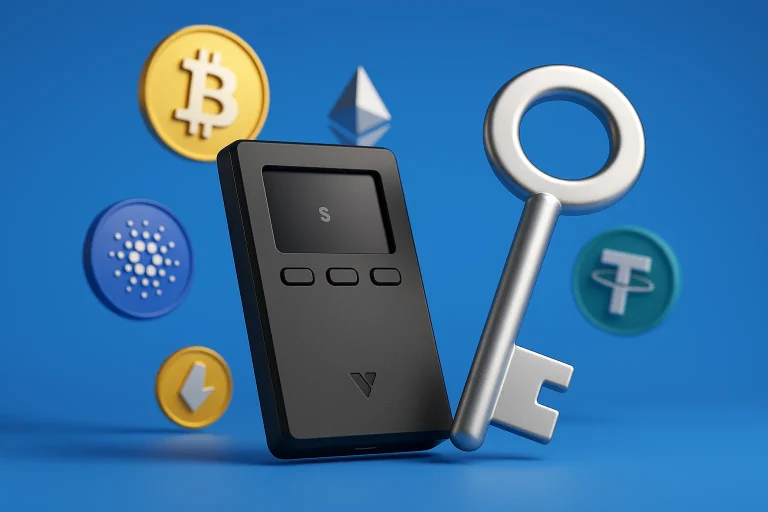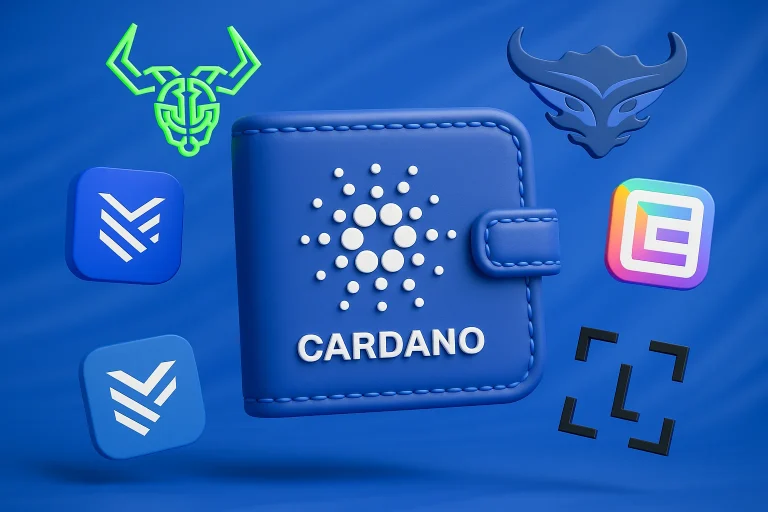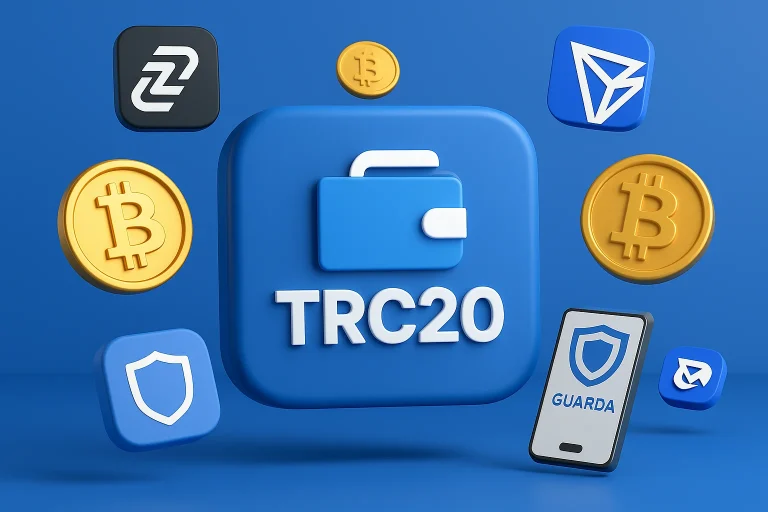In 2026, the crypto world is bigger, faster, and more advanced than ever. Yet many people still ask, “Which crypto wallet should I use?”. Yet, when comparing the best wallets, the first thing to decide is whether you prefer a custodial or non-custodial setup.
With so many wallets on the market: mobile apps, browser extensions, hot wallets, and hardware wallet options, it’s easy to feel lost. Selecting the wrong one can result in weak security features, limited coin support, or a confusing user experience.
As global crypto users passed 560 million in 2024, choosing a wallet that fits your needs is more important than ever, whether you’re just starting out or already deep into managing digital assets.
That’s why we created this guide.
Here, we compare the top crypto wallets of 2026 side by side. You’ll see how each performs in terms of security, ease of use, supported assets, and features such as staking, swapping, or NFT access. This guide will help you decide whether to safely store Bitcoin, explore NFTs, or manage crypto assets and altcoins.
To help you decide, we put together a simple comparison table of the best crypto wallets. It shows what each wallet is best suited for, which coins it supports, its level of security, and how easy it is to use.
Table of contents
Top Crypto Wallets: Quick Comparison | |
|---|---|
| Rabby Wallet | Best For: Browser-Based Advanced Users Type: Browser Extension Supported Assets: EVM chains, L2s, NFTs Security Level: High User-Friendliness: High |
| MetaMask | Best For: Browser-Based Defi & NFTs Type: Software/ Browser Supported Assets: ETH, ERC-20, NFTs, L2s Security Level: Medium User-Friendliness: High |
| Coinbase Wallet | Best For: Beginners & Fiat Integration Type: Software/ Browser Supported Assets: BTC, ETH, SOL, fiat, NFTs Security Level: Medium User-Friendliness: Very High |
| Ledger Live | Best For: Secure Cold & Hot Storage Combo Type: Hardware + App Supported Assets: BTC, ETH, altcoins, NFTs Security Level: Very High User-Friendliness: Moderate |
| Trust Wallet | Best For: Altcoin Diversity & Mobile Users Type: Mobile/ Software Supported Assets: BTC, ETH, BNB, +100+ coins Security Level: Medium-High User-Friendliness: Very High |
1. Rabby Wallet, Best for Browser-Based Advanced Users

Rabby Wallet is the most sophisticated browser-based wallet for advanced crypto users. It offers superior transaction preview capabilities and multi-chain support beyond traditional wallets. The wallet’s ability to display transaction details before signing makes it invaluable for DeFi interactions and complex smart contract operations.
Key Features: | |
|---|---|
| Advanced transaction preview | Shows exactly what will happen before you sign any transaction |
| Multi-chain support | Seamlessly works across multiple EVM-compatible networks |
| Portfolio management | Comprehensive overview of all your assets across different chains |
| DeFi integration | Built-in support for major DeFi protocols |
| Gas optimization | Automatic gas fee suggestions to save on transaction costs |
Why We Choose It
Rabby Wallet is ideal for experienced users who frequently interact with DeFi protocols and need crystal-clear transaction previews to avoid costly mistakes.
2. MetaMask, Best for Browser-Based Defi & NFTs

As one of the most popular software and browser wallets, MetaMask remains the gateway to the Ethereum ecosystem and DeFi. It supports many decentralized applications and offers seamless integration with Layer 2 solutions and NFT management.
Key Features: | |
|---|---|
| Universal dApp Compatibility | Works with nearly every Ethereum-based application |
| NFT management | Built-in NFT viewing and management capabilities |
| Layer 2 support | Seamless integration with popular L2 solutions like Polygon and Arbitrum |
| Mobile synchronization | Desktop and mobile versions sync perfectly |
| Staking features | Direct access to Ethereum staking services |
Why We Choose It
MetaMask is the go-to crypto wallet for users exploring Ethereum DeFi and NFTs who want a versatile, widely supported cryptocurrency wallet.
3. Coinbase Wallet, Best for Beginners & Fiat Integration
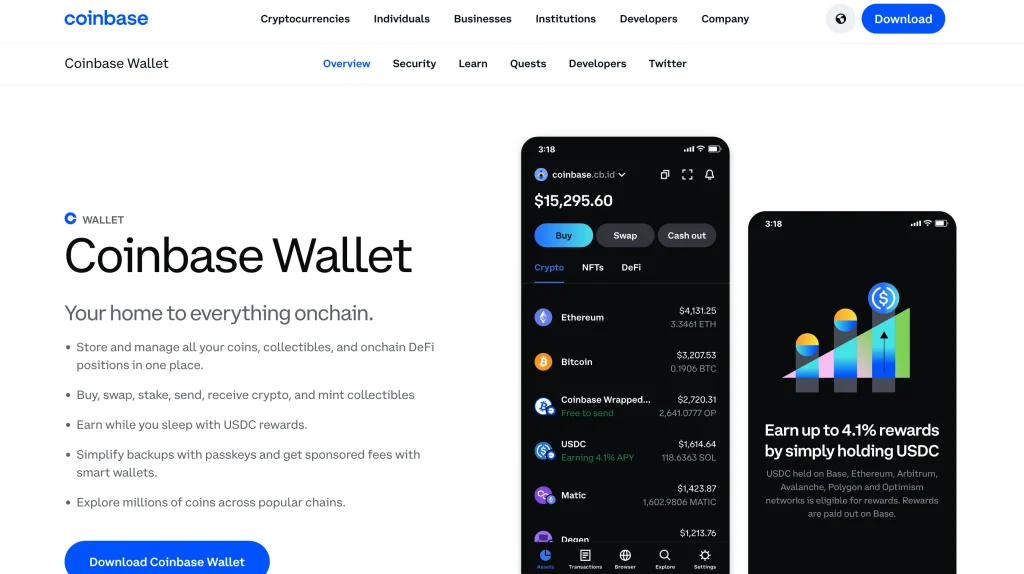
Coinbase Wallet makes it easy to move from traditional finance into crypto. It’s the perfect starting point for beginners. Thanks to its integration with the Coinbase exchange, users can buy crypto directly with fiat, and no extra steps are needed.
This creates a smooth and straightforward experience for anyone new to digital assets.
Key Features: | |
|---|---|
| Fiat integration | Direct buying and selling with traditional currencies |
| Multi-asset support | Supports Bitcoin, Ethereum, Solana, and numerous altcoins |
| User-friendly interface | Intuitive design that doesn’t intimidate beginners |
| Backup and recovery | Simplified seed phrase backup with cloud options |
| Educational resources | Built-in learning materials and tutorials |
Why We Choose It
Coinbase Wallet is ideal for beginners who want a familiar, secure wallet experience with integrated crypto exchange access.
4. Ledger Live, Best for Secure Cold & Hot Storage Combo
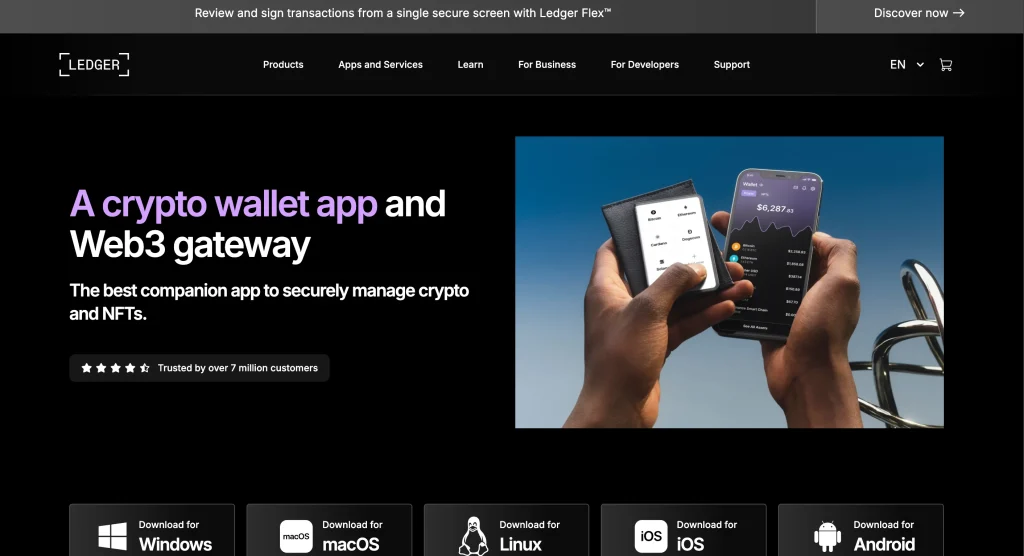
Ledger Live offers the highest level of security in the crypto world when used with Ledger hardware wallets. Hardware-based security protection provides unmatched peace of mind for users holding large amounts of cryptocurrency. It’s perfect for securing large holdings with enhanced security.
Key Features: | |
|---|---|
| Hardware security | Private keys never leave the secure hardware device |
| Comprehensive asset support | Supports thousands of cryptocurrencies and tokens |
| Staking capabilities | Direct staking for multiple proof-of-stake networks |
| Portfolio tracking | Complete overview of all holdings and performance |
| NFT management | View and manage NFT collections securely |
Why We Choose It
Ledger Live is a must-have for serious investors who value security over convenience and manage large crypto portfolios.
Earn passive income while holding your crypto — here’s where to start staking smart.
5. Trust Wallet, Best for Altcoin Diversity & Mobile Users

Trust Wallet excels as a mobile-first solution that supports an impressive range of cryptocurrencies and blockchain networks. Its clean interface and comprehensive altcoin support make it perfect for users who trade diverse portfolios on the go.
Key Features: | |
|---|---|
| Extensive asset support | Supports over 100 different cryptocurrencies and tokens |
| Mobile-optimized | Designed explicitly for smooth smartphone usage |
| Built-in exchange | Swap between different cryptocurrencies directly within the app |
| Staking rewards | Earn rewards on supported proof-of-stake assets |
| dApp browser | Access decentralized applications from your mobile device |
Why We Choose It
Trust Wallet is perfect for mobile-first users who trade diverse altcoin portfolios and need a reliable, feature-rich smartphone wallet.
How to Choose the Best Crypto Wallets
Choosing the right crypto wallet depends on your needs and experience level. Here are the five most important things to look for:
1. Security: Non-custodial, Private Key Control, or Hardware Options?
Security should always come first. A non-custodial wallet means you control your private keys, not a third party. That’s essential for actual ownership of your crypto. Look for wallets that include:
- Seed phrase backups;
- Two-factor authentication (2FA);
- Biometric login (like fingerprint or face ID).
Hardware wallets are the best choice for the highest level of protection. They store your private keys offline, keeping them safe from online hacks.
2. Asset Support: Bitcoin, Altcoins, NFTs?
Not all wallets support every type of cryptocurrency. If you just hold Bitcoin or Ethereum, most wallets will work. But if you also trade altcoins or collect NFTs, ensure your wallet can handle them.
Choose a wallet that supports a wide range of assets, so you’re ready to grow your portfolio in the future.
3. Ease of Use: Setup, Daily Use, or Mobile-Friendliness?
Some wallets are simple and great for beginners. Others are packed with features for advanced users. Think about how you’ll use your wallet:
- Are you new to crypto? Go for a simple interface with guides or tutorials.
- Will you be using it every day on your phone? Choose a mobile-friendly wallet.
The best wallets strike a balance between power and simplicity.
4. Cross-Platform Support: Browser, Mobile, Hardware Integration?
Good wallets let you access your crypto on multiple devices: phone, desktop, and browser. Some even sync with hardware wallets, giving you extra security without sacrificing convenience.
If you switch between devices often, cross-platform support is a must.
5. Extra Features: Staking, Defi, or Swaps?
Modern wallets can do more than just hold your crypto. Some include:
- Staking: earn rewards on proof-of-stake coins
- Swaps: trade one crypto for another without leaving the wallet
- DeFi tools: access decentralized apps for lending, farming, or borrowing
These features are great for active users, especially if you’re into DeFi or want to maximize earnings.
If you’re serious about storing Bitcoin securely, Electrum remains one of the most trusted and lightweight wallets available.
Crypto Wallet Security: Best Practices
Crypto hacks totaled $1.63 billion in Q1 2025, marking a 131% increase year over year. Thus, whether you’re a beginner or an experienced investor, following wallet security best practices is essential to keeping your funds safe.
1. Always Backup Your Recovery Phrase
Every non-custodial wallet (MetaMask, Trust Wallet, or Ledger) gives you a recovery phrase called a seed phrase. This is the only way to restore your wallet if your device is lost, stolen, or damaged.
Best practice:
- Write it down on paper or store it in a secure offline location.
- Never share your recovery phrase with anyone.
- Avoid saving it in cloud storage or on your phone.
2. Use a Hardware Wallet for Large Holdings
A hardware wallet like Ledger or Trezor is the most secure option if you’re storing significant amounts of crypto. These devices keep your private keys offline, away from hackers and malware. Hot wallets (apps or browser extensions) are convenient but are always connected to the internet, making them vulnerable to attacks.
Combine Ledger with the Ledger Live app for added convenience without sacrificing security.
3. Enable Two-Factor Authentication (2FA)
Many wallets and crypto exchanges support 2FA for extra protection. This adds a second layer of security beyond just a password. Options:
- Use an app like Google Authenticator or Authy.
- Avoid SMS-based 2FA, as it’s easier to hack through SIM-swapping.
4. Protect Your Devices
A wallet is only as secure as the device it’s installed on. Keep your smartphone, laptop, or hardware wallet secure by:
- Installing updates regularly.
- Using antivirus software.
- Avoiding suspicious downloads and phishing links.
5. Be Wary of Phishing Attacks
Phishing is one of the most common crypto scams in 2026. It can happen via fake websites, emails, or even wallet popups asking you to approve dangerous transactions. How to stay safe:
- Always check URLs before connecting your wallet.
- Bookmark official wallet websites. (e.g.,https://metamask.io orhttps://rabby.io)
- Never approve a transaction you don’t understand.
6. Use Wallets With Open Source or Audited Code
Choose wallets with a strong track record of security audits or open-source codebases. This transparency allows the crypto community to detect bugs or vulnerabilities faster.
7. Avoid Reusing Wallets for Airdrops or Testing
Many scams disguise themselves as free airdrops or new dApps. If you’re exploring new or untrusted platforms, use a separate wallet with minimal funds.
Step-by-step tips for smooth token transfers without breaking the bank.
FAQ
What Is the Best Crypto Wallet?
The best crypto wallet is the one that fits your needs. If you’re new to crypto, Coinbase Wallet offers the easiest start. For active DeFi users, MetaMask or Rabby Wallet are top choices. If security is your priority, Ledger Live with a hardware device is the safest.
There’s no universal winner. Your ideal wallet depends on how you plan to use your crypto.
What Is the Best Bitcoin Wallet?
A hardware wallet like Ledger or a mobile wallet like Trust Wallet offers strong support and security for Bitcoin-only users. Choose based on how often you transact and how much BTC you hold.
Can I Recover My Crypto if I Lose My Phone or Device?
Yes, if you backed up your wallet’s recovery phrase (seed phrase). You can use it to restore your wallet on a new device. Without it, recovery is impossible.
Can I Use the Same Crypto Wallet on Multiple Devices?
Most modern wallets allow this. Apps like MetaMask, Trust Wallet, and Coinbase Wallet support syncing between mobile and desktop. Just make sure to secure your recovery phrase.
Are Hot Wallets or Cold Wallets Safer?
Cold wallets (Ledger) are safer because they store your keys offline. Hot wallets are more convenient for daily use but are more exposed to online threats.
What Are the Best Wallets for Staking Crypto?
Ledger Live, Trust Wallet, and MetaMask all offer staking features. Trust Wallet is easiest for mobile staking, while Ledger is best for long-term holders.
Final Thoughts
Choosing the right crypto wallet matters whether you’re trading altcoins, collecting NFTs, or holding Bitcoin safely. With so many wallets, finding one that matches your skill level, security needs, and how you plan to use your crypto is essential.
The top crypto wallets of 2026, such as Rabby Wallet, MetaMask, Coinbase Wallet, Ledger Live, and Trust Wallet, have strengths. Some are great for beginners, while others are perfect for DeFi or maximum security. There’s no single “best” wallet for everyone. But now, with this guide, you know what to look for.
Take control of your crypto journey. Choose a wallet that’s safe, easy to use, and built for the future. Whether you’re just starting or managing a big portfolio, the right wallet will help you explore the crypto world confidently.


